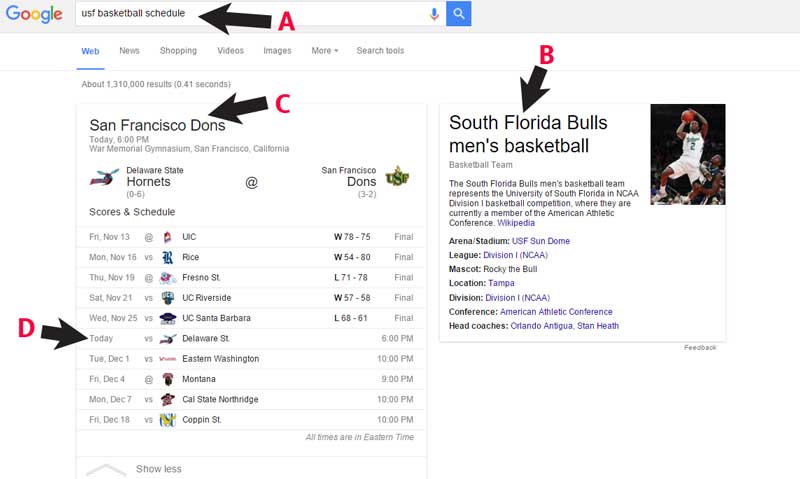
I received a phone call from a friend on Saturday saying that I can have 6 tickets for the Sunday University of South Florida (USF) Bulls Basketball game. The seats were a few rows from the floor behind the home team bench. I accepted the offer and my friend sent a text that the game started at 6 pm. On Sunday morning, game day, I had my son “Google” the USF schedule, to double check the game time. He confirmed that it was 6pm. I was working at in the yard Sunday afternoon, and came inside at 3 pm to get ready for the game, only to check a text on my phone from my friend saying that the game was already underway. He made a mistake on the time. How did two people make a mistake on the game time? I told my son to show me what he saw on the Google search results.
How Google Search Results got it wrong.
The above image is screenshot of the search results that both saw.
Label A: Both searched for the same phrase, “USF basketball schedule”. We are doing the search from Tampa, FL so Google correctly displayed the local results in Tampa, FL under Label B.
Label B: Label B gives an obvious visual with the image and title that confirms to the viewer that they indeed have the correct team. The problem is that that Label B does not have the schedule. The first item in the organic search results has the schedule.
Label C: Google tries to bring up the schedule of the basketball team. At first Glance, I assumed the USF bulls were playing the San Francisco Dons.
Label D: The schedule says that today’s game starts at 6 pm. If you look closely, it says the opponent is Delaware State.
If you spend a little time on this page, it is clear that Google is giving you the results of the University of San Francisco’s (another USF) men’s basketball team.
Problems with the search result:
Google recognized that it was a local search and wanted to give a quick result so that you would not have to use an extra click to have to go to the actual webpage. We make web pages for people to visit. Google is taking the information off of our websites to make their user experience better and keeping people from going to our websites. Many times, users go to local business websites for quick information like obtaining a phone number or address. These quick site visits actually can hurt your google search positions as Google is keeping track of users “Time on Site”. They figure if someone searches for something and someone clicks on your website link and does not stay on long, then they probably did not find what they are looking for. This is a double edge sword: Google is stealing website visits and potentially penalizing our sites when people do visit our sites even though our users are getting the information that they wanted.
The real salt in the wound is when Google tries to keep people from the site they wanted to visit, in this case the University of South Florida Bulls men’s basketball page, and gives the wrong schedule. If the SERP is picking up a local result why would it display a schedule from a team that is a thousand miles away?
I missed a great event from relying on Google. Make sure you get your information from the official sites of your events and vendors.


